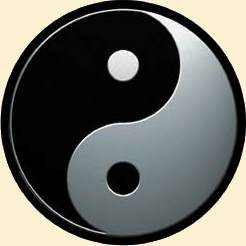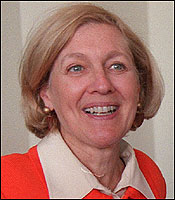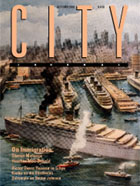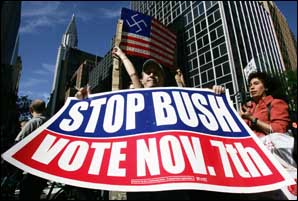 Exit polls showed that, once again, self-identified moderates made up a near-majority of the electorate — 47 percent — and this group split 62 percent to 36 percent Democratic — a 9-point Democratic gain from 2002 and 8 points above 2004.
Exit polls showed that, once again, self-identified moderates made up a near-majority of the electorate — 47 percent — and this group split 62 percent to 36 percent Democratic — a 9-point Democratic gain from 2002 and 8 points above 2004.
--Roll Call’s Mort Kondracke
Yin-yang: complementary division, male and female, two halves combine to make a whole. Many hope that Democrats in Congress and President Bush will create a female-male,
yin-yang complementarity. Voters—the moderates who replaced partisan Republicans with new Democrats—are tired of bitter division and want cooperation and progress.
But
yin-yang unity is not to be. Why?
•
The country is pretty evenly divided into two warring camps. The Republicans effectively nationalized congressional elections in 2002 and 2004, turning out Democrats for being wrong on the War on Terror. Now we have a third straight nationalized election, this time by the Democrats running in every section of the country against Bush and (the heretofore-unknown) Mark Foley. Nationalized elections and polarization are the result of efficient political operations that find and bring home their voters. These nationalized elections are here to stay, and will keep America divided.
•
2008 will shape the next two years in Washington. Democrats in Congress aren’t interested in passing the kind of legislation Bush might sign. They’re interested in electing a Democratic president in 2008, so they can truly take over. Every issue they push through Congress will be designed to divide Republicans from the national majority, so that Democratic control will replace divided government. Every Congressional investigation of Bush administration wrongdoing will reach for the same objective. Taking over Congress is just a first step to true power.
•
Only united government produces real change. The last burst of real Democratic creativity came in 1964-65, when in the aftermath of Kennedy’s assassination, Democrats had the full control they needed to pass tax reform, civil rights legislation, Medicare, and the National Education Act. Reagan had a burst of creativity in 1981-82, because a Republican Senate and Southern “Blue Dog” House Democrats provided the majority needed to cut taxes and the size of government. Then after Clinton beat back Newt Gingrich’s effort to shut down the Federal government in 1995, the two united to produce welfare reform and the balanced budgets that turbocharged our late 1990’s economy. Clinton needed Republicans to give him a record to run on for re-election. And Gingrich fully understood he was aiding Clinton’s re-election. Democratic leaders, unlike Gingrich, hope for their own president in 2008. Once
everything is pink, Democrats will achieve their next burst of creativity.
A couple of other points about divided America:
• Rahm Emanuel, guru of the House Democratic take-over, is not only a Clinton insider, his Hollywood agent brother Ari gives Rahm a direct link to Beverly Hills. According to Wikipedia, “Bradley Whitford's character Josh Lyman on NBC television series
The West Wing is. . . based on Emanuel. His younger brother Ari . . . inspired Jeremy Piven's character Ari Gold on the HBO series
Entourage.” Hollywood, of course, represents the polar opposite to Evangelical America.
• Unified rule can blow up in your face. To hold Republicans together, Bush had to entertain the views of his extremes (House Republicans would only pass programs supported by a majority of their majority, which equals minority rule). Extremism ended up costing Republicans the election. The same thing happened in 1993-94, the last time Democrats controlled everything.
 Woops, Iraq’s Uncle Ho does exist.
Woops, Iraq’s Uncle Ho does exist.
















